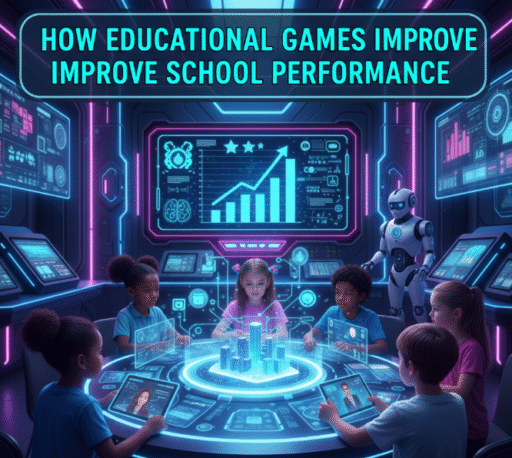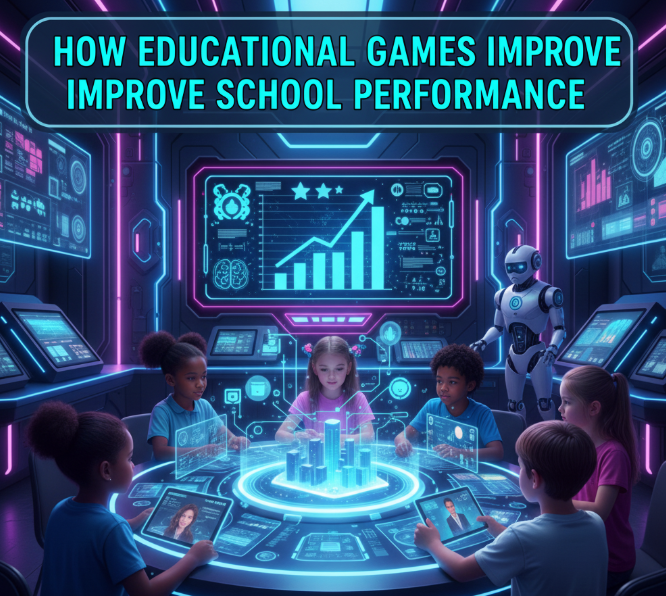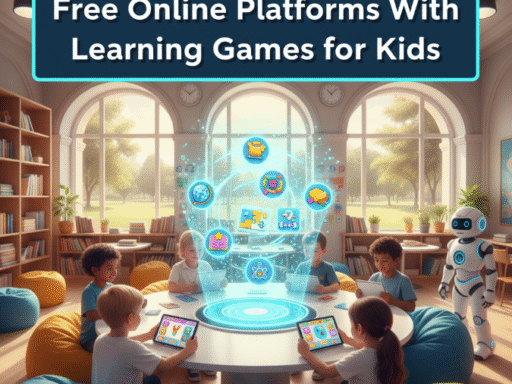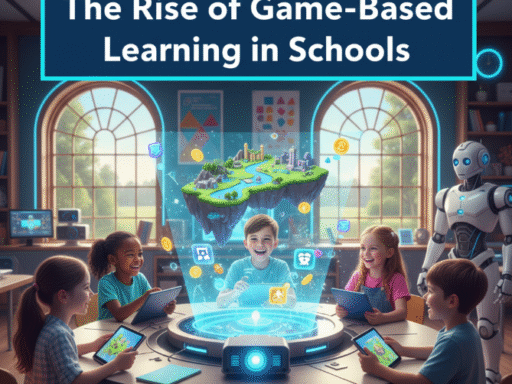Introduction: Learning Meets Fun
For many years, school has been seen as a place where children sit quietly, listen, and memorize facts. But in today’s world, education is changing. Teachers and parents are discovering that when learning feels fun, students not only pay more attention but also remember information better. One of the most powerful tools making this shift possible is educational games.
Educational games are not just about entertainment. They are carefully designed to teach math, reading, science, problem-solving, and even teamwork. By blending play with learning, they make lessons more engaging and meaningful. And when children enjoy the process, their school performance improves dramatically.
This article will explore how educational games improve school performance, highlighting the specific skills they build, the types of games that work best, and why schools and parents should embrace this approach.
Why Games Work as Powerful Learning Tools
Games are naturally motivating. Whether on a board, a phone, or in a classroom, they tap into a child’s desire to win, explore, and achieve goals. This motivation is key in education because motivated students put in more effort, practice longer, and overcome challenges with excitement rather than frustration.
Here are some main reasons games work so well:
-
Active learning: Students interact with material instead of passively listening.
-
Instant feedback: Mistakes are corrected immediately, helping students learn faster.
-
Safe failure: Children can try again without embarrassment, which builds resilience.
-
Personalized pace: Students can learn at their own speed, boosting confidence.
Key Ways Educational Games Improve School Performance
1. Strengthening Core Academic Skills
Educational games directly support subjects taught in school.
-
Math games improve number recognition, problem-solving, and logical thinking. For example, puzzle apps that ask children to solve equations before advancing to the next level make math fun.
-
Reading games improve vocabulary, spelling, and comprehension by turning stories into interactive challenges.
-
Science games help students understand concepts like the solar system, biology, or physics through simulations.
Example:
| Subject | Game Benefit | Impact on School Performance |
|---|---|---|
| Math | Solving puzzles, equations, patterns | Better test scores in problem-solving |
| Reading | Interactive stories, word games | Improved reading comprehension and fluency |
| Science | Simulations, experiments | Stronger grasp of scientific concepts |
By practicing school subjects in game form, students strengthen the very skills they are tested on.
2. Boosting Concentration and Memory
Many students struggle to stay focused in class. Educational games solve this by keeping children actively engaged.
-
Memory-based games (like matching cards or pattern recall) train the brain to hold and retrieve information.
-
Strategy games improve attention span because players must think ahead and plan moves.
Better concentration and memory mean that when students return to traditional lessons, they can follow instructions, take notes, and recall details more effectively.
3. Building Problem-Solving and Critical Thinking
Educational games often present challenges that don’t have a single solution. For example:
-
A math puzzle may require multiple steps.
-
A science game might involve experimenting with different solutions to find the correct outcome.
-
A geography game could ask students to plan routes or explore maps.
These situations encourage critical thinking, which is essential not just for exams but also for life. Students learn to:
-
Break down big problems into smaller steps.
-
Test ideas and evaluate outcomes.
-
Develop creativity in finding solutions.
4. Encouraging Teamwork and Social Skills
Not all learning happens alone. Multiplayer educational games encourage students to:
-
Collaborate with peers.
-
Share strategies.
-
Compete in a friendly way.
In classrooms, teachers can use group-based educational games to build cooperation. For example, a history quiz game can be played in teams, promoting both academic growth and teamwork. These social skills carry into group projects, presentations, and future workplaces.
5. Increasing Motivation and Confidence
One of the most common reasons students underperform in school is a lack of confidence. Games solve this by offering:
-
Levels and rewards: Every small success feels like an achievement.
-
Encouragement to try again: Children don’t fear mistakes because they can always restart.
-
Visible progress: Students see their growth, which builds self-esteem.
When students feel confident in a subject, they participate more in class, complete homework with enthusiasm, and perform better on tests.
6. Supporting Different Learning Styles
Not all students learn the same way. Some are visual learners, others learn by doing, and some prefer listening. Educational games cover all these styles:
-
Visual learners benefit from colorful graphics, animations, and diagrams.
-
Kinesthetic learners enjoy interactive, hands-on gameplay.
-
Auditory learners absorb knowledge through narration, instructions, and sound effects.
By appealing to all styles, games help every student access knowledge in the way that suits them best.
7. Reducing Stress and Making Learning Fun
Traditional exams and homework often cause stress. Educational games turn practice into something enjoyable. This reduces anxiety and helps children associate learning with positive feelings. A relaxed student is far more likely to perform well than a stressed one.
Different Types of Educational Games That Improve Performance
Digital Games (Apps and Online Platforms)
-
Math apps like Prodigy or DragonBox make arithmetic fun.
-
Language apps like Duolingo for Kids boost vocabulary.
-
Science simulations let students explore without needing a lab.
Board and Card Games
-
Scrabble or Boggle improves spelling and vocabulary.
-
Chess develops logical thinking and strategy.
-
Monopoly teaches basic economics and money management.
Classroom Activity Games
-
Quiz competitions encourage quick thinking.
-
Role-playing games bring history or literature to life.
-
Interactive whiteboard games turn lessons into playful challenges.
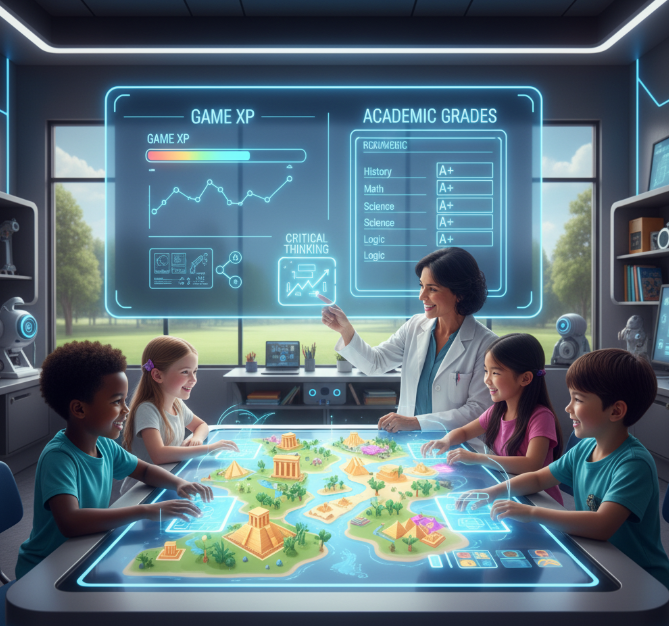
How Educational Games Improve School Performance
Real-Life Impact: Research and Statistics
Studies have shown clear connections between educational games and school performance.
-
A report by the Joan Ganz Cooney Center found that students who regularly used educational games scored 15% higher in math compared to those who didn’t.
-
A University of Michigan study showed that reading comprehension improved by 12–18% when children practiced with interactive reading games.
-
Teachers reported that students using classroom games had higher participation and lower dropout rates.
Sample Chart: Effect of Educational Games on Academic Performance
This data shows that educational games are not just entertainment—they have measurable academic benefits.
Practical Tips for Parents and Teachers
For Parents
-
Choose age-appropriate games that align with your child’s school subjects.
-
Balance game time with outdoor activities and reading.
-
Play with your child to encourage bonding and learning together.
-
Monitor progress by checking in on what skills they’re improving.
For Teachers
-
Integrate short game sessions into lessons to keep students energized.
-
Use group-based educational games to build collaboration.
-
Track student progress through digital platforms.
-
Encourage healthy competition with leaderboards and rewards.
Common Concerns About Educational Games
“Won’t kids just get addicted to screens?”
Not if games are balanced with other activities. Setting limits ensures games remain tools for learning rather than distractions.
“Are games really as effective as traditional methods?”
Games should complement, not replace, traditional teaching. They make practice enjoyable and help reinforce lessons already taught.
“Do all games count as educational?”
No. Only games specifically designed with learning objectives truly help school performance. Parents and teachers must choose carefully.
The Future of Educational Games in Schools
As technology advances, educational games are expected to play an even bigger role. Virtual reality (VR) and augmented reality (AR) can bring history, science, and geography to life in ways that textbooks cannot. Imagine exploring the pyramids of Egypt in VR or experimenting with atoms in a safe digital lab—these innovations will transform education.
Schools that adopt these tools will likely see:
-
Better student engagement.
-
Improved test scores.
-
Higher creativity and problem-solving skills.
Conclusion: Turning Play Into Progress
Educational games are far more than just entertainment. They are tools that build academic skills, sharpen memory, encourage teamwork, and boost confidence. By making learning fun, they transform the way children engage with school subjects.
For parents, introducing the right games at home can strengthen a child’s school performance without pressure. For teachers, using games in the classroom creates a lively, interactive learning environment.
The future of education lies in blending play with knowledge. When children enjoy learning, their performance doesn’t just improve—it soars.
